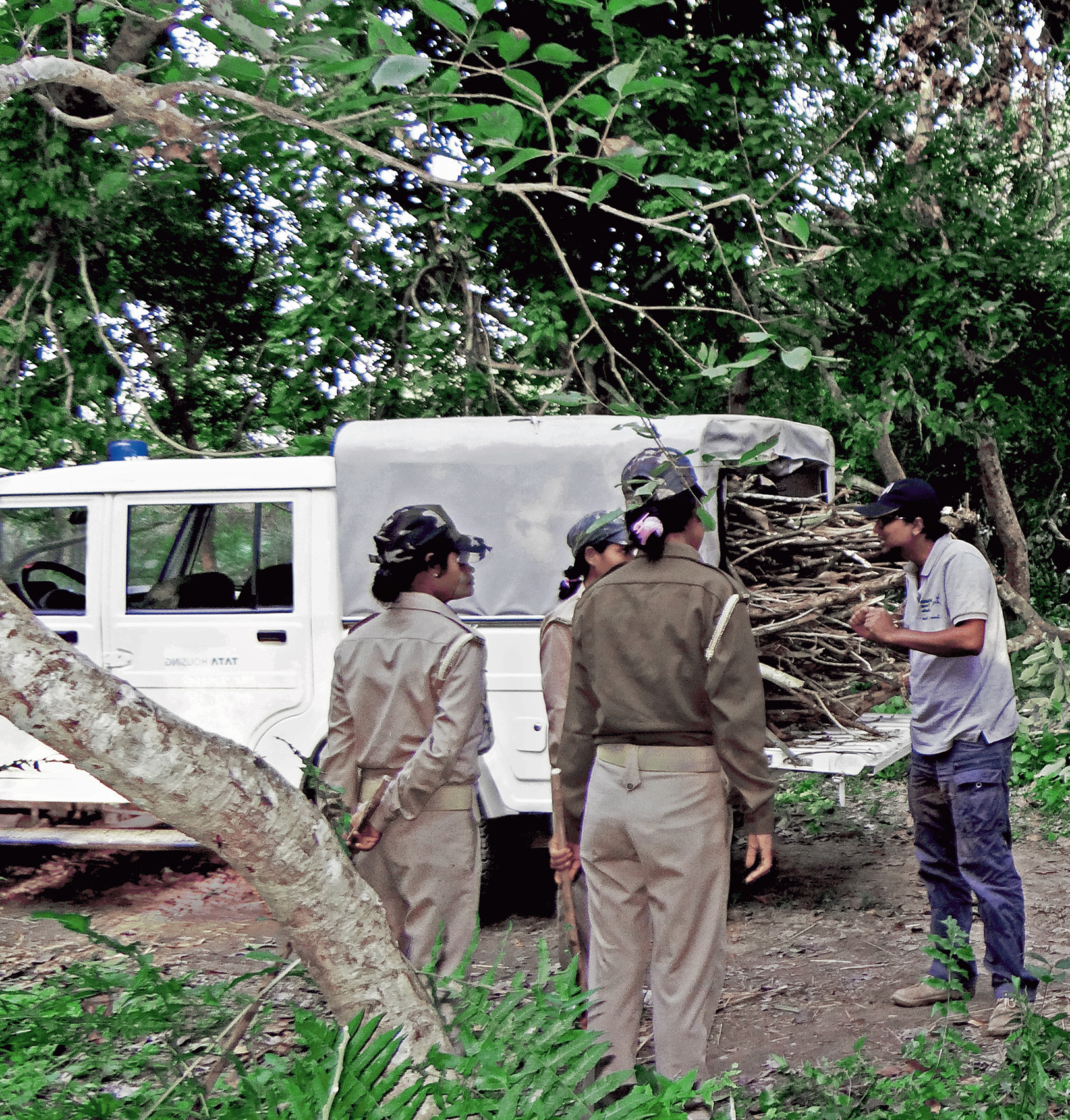A Different Beat
First published in Sanctuary Asia,
Vol. 35
No. 6,
June 2015
By Akash Bisht and Saurabh Singhai
India’s forest service is overwhelmingly a male bastion, but change is afoot – though it moves as yet in halting, fragile, infant steps. An example: the Dudhwa Tiger Reserve, where the administration has employed women from villages around the reserve as forest watchers.
“I used to feel scared when I went into the forest,” says Ramkumari, aged 22, “but now I don’t. In fact I have grown to like it. I like the quiet of the forest.”
Ramkumari is an unmarried undergraduate and hails from village Poya, contiguous to the Chandanchouki Range of Dudhwa Tiger Reserve in Uttar Pradesh. She leaves home by 7.30 on most mornings, reporting for duty at the range office to deputy ranger (in-charge) Vijay Bahadur Singh. By 9 a.m. she is out on patrol, accompanied by other forest watchers. Her beat: a near 20 km. round-trip through the jungle, covered on foot. On most days she returns home by 7 p.m., nearly 12 hours after she left.
_C_Bharat-Goel-1700_1615264873.jpg)
Having to patrol the forest on foot, these guards brave wild animals such as tigers, poachers and local miscreants while on duty every single day.
Photo:Bharat Goel
FOUR UNIFORMED WOMEN
We first encountered Dudhwa’s intrepid women forest watchers on a gloomy November evening last year. We were returning to our field camp after a site visit in the tiger reserve, when we came upon a Forest Department vehicle parked in the middle of a jungle road.
Forest officials were throwing bundles of dry wood into the back of the vehicle. A seizure of illegally-chopped firewood is not unusual in itself, but we were more than a little surprised to see four uniform-clad women giving instructions to some of the uniformed men. Now that, in the forest service, is unusual to say the least!
One of our team members introduced us to G. Shukla, Deputy Ranger of the Sathiyana Range, who was quite chuffed about the seizure his team had made. We gently broached the real subject of our interest: the women in uniform. “They are part of the Prantiya Raksha Dal,” said Shukla. “They now work with the department as forest watchers on a contractual basis. You see, it is often difficult for our men to deal with the local women when it comes to seizing firewood. But these brave women make our work easy; they are as fierce with women as they are with men – in fact even the local men are terrified of them!”
The four women were introduced to us as Chitravati, Anju Kumari, Ramkumari and (also) Ramkumari. They giggled at the questions we volleyed at them, amused at the degree of interest we were showing about their work.
“Balancing work and family is tough,” Chitravati responded to one of our queries, “especially when you are married. But my husband often says that he is very proud of me. He even brags to his friends about the kind of work I do! And I like my work. It is a very tough job but it also has its thrills.”

Their diligence ensures that the wild denizens of Dudhwa, like these barasingha, can live undisturbed.
Photo:Rajarshi Banerji
FEARLESS, SINCERE, HONEST
‘Tough job’ is an understatement if anything. These women have to patrol the forest on foot, which brings them in contact not only with wild animals, but armed poachers as well as local miscreants who enter the reserve to graze cattle and collect firewood.
“There should be at least one forest guard with us when we are on patrol,” Anju Kumari told us, “but that doesn’t always happen. Sometimes we catch women cutting down trees, but they threaten us with their axes or knives. We don’t have weapons, not even a stick. We should have some means of self defence.”
Through scorching summers, monsoon rains and winter cold they walk the forest, seven days a week. And since they are employed as daily wagers, on a non-permanent basis, most of them have to wait months before they receive any remuneration.
Still, just a decade ago only about 19.5 per cent of the total rural female population was employed and the proportion of ‘main female workers’, as assessed in 2001, was merely 6.8 per cent. It is heartening therefore to see that of the 52 members of the Prantiya Raksha Dal employed in Dudhwa, more than one-third are women. That they have made a good fist of it in an entrenched patriarchal culture like that of Uttar Pradesh, enduring the hardships of the job and eking out a living with pride, makes it a worthwhile experiment.
V.K. Singh, Deputy Director of the Dudhwa Tiger Reserve calls it an important effort in making women stakeholders in forest protection: “We should try to accommodate more women in the department,” he declares. “These women are fearless, sincere, honest... and they do not even consume alcohol!”

Women forest watchers inspect the illegally-chopped firewood that they have seized.
Photo:Saurabh Singhai/WTI
WEARING THEIR HEARTS ON THEIR SLEEVES
The lack of equipment and infrastructure is always an issue for frontline forest staff (both men and women) in India. The Wildlife Trust of India runs a Big Cat Conflict Mitigation Project out of the Dudhwa Tiger Reserve, and Aircel, one of the project sponsors, had sanctioned an additional grant to provide bicycles and winter jackets to the forest guards there. The company generously decided to distribute jackets to all the women forest watchers working in Dudhwa as well, as a token of appreciation for their dedication.
“The jacket helped me a lot during the winters,” Ramkumari tells us. “But more than anything it has the Forest Department logo on it. It gives us a feeling that we belong to the department. It gives us a sense of pride.”
Akash Bisht is Assistant Manager, Awareness for Conservation at the Wildlife Trust of India. Saurabh Singhai is a wildlife veterinarian with WTI’s Tiger Conservation Project in Uttar Pradesh.
First published in: Sanctuary Asia, Vol. 35 No. 6 , June 2015.

_C_Bharat-Goel-1920.jpg)
_C_Bharat-Goel-1700_1615264873.jpg)

